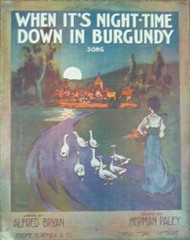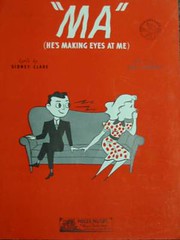As I do with so many donations to the Library, I grabbed a stack of new acquisitions and sat at a PC, entering the new cataloguing information into the Library's database. This is a dull task in most other situations, but I like doing it at the Library: I get to handle the music, look at who wrote it, where and when it was published, even read the lyrics.
As can be detected in my other posts, I prefer music published in the early 20th century. I know it's often trite, culturally obtuse, and not very experimental, but it appeals to me as few current genres of music do. Maybe I'm susceptible to nostalgia: in, say, 1918, would I have been considered something like Samuel Siegel's "Ragtime Echoes" as modernistically offensive as some of my contemporaries?
Whether it is simply a passing phase of our decadent art culture or an infectious disease which has come to stay, like la grippe and leprosy, time alone can show
– Etude magazine critic Edward Baxter Perry, quoted in This Is Ragtime by Terry Waldo
Among the new donations (the treasure of a garage in Stockton, California) were several piano albums, the kind amateur musicians use when they need the basic melody and lyrics to popular songs. I started at the top of the stack, the most recently published selections. These were mostly from the early 1970's, with the apparently requisite puffy lettering and Peter Max illustration style on the covers. The song titles were certainly familiar to me: they were played on the radio frequently when I was a kid–"One Tin Soldier," "Bad Bad Leroy Brown," "Delta Dawn"; the soundtrack of stagflation– and I probably know them better thanks to ceaseless TV ads for the K-tel hits collections.
As I entered the data for these songs I started feeling gloomy. I wondered why I felt so less intrigued by this music. Was it because, even at the time, I thought the early Seventies was one of the most aesthetically repulsive eras of human history? Yet, as I created a new catalogue entry for "The Entertainer," I remembered that the time wasn't all bad. We got another Ragtime Revival, for instance, thanks to Marvin Hamlisch's anachronistic score for The Sting. But the next entry was for an annoying piece called "Dreams of an Everyday Housewife." Reading the patronizing lyrics for this one, which I don't remember on the hit parade at all, helped me understand why Ms. magazine was founded about the same time.




